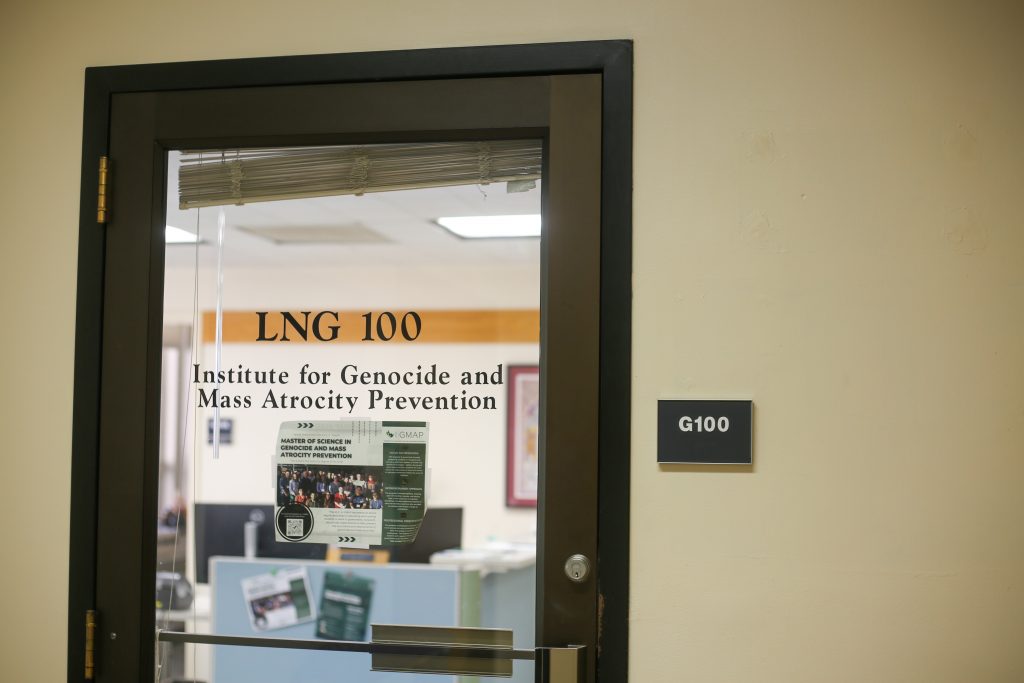On Monday, the Institute for Genocide and Mass Atrocity Prevention (I-GMAP) hosted its first webinar of the academic year, featuring visiting practitioner Frank Osei.
The webinar, “Blueprint for Sustainable Peace? Practitioners’ Perspective on Infrastructure for Peace in Africa,” served as a forum to raise awareness and “contribute to the debate on effective ways of building sustainable peace in Africa.” Panelists shared their insights on the role of infrastructure for peace in the African context and the intersection of “infrastructure, conflict resolution and sustainable development.”
The panel began with a brief introduction of the panelists, including Osei, a former I-GMAP Resident Practitioner and head of the Peace Support Operations Program at the Kofi Annan International Peacekeeping Training Center in Ghana (KAIPTC). Osei has worked as an expert on the implementation of the Responsibility to Protect (R2P) framework — a global standard aimed at preventing the international community from failing to stop “genocide, war crimes, ethnic cleansing and crimes against humanity.” He has also been involved in risk-assessment modeling for African governments and civil society institutions, consulting for multiple organizations, including the United Nations Office of the Special Advisor on Genocide Prevention. Osei is currently a part of the public administration doctoral program at Binghamton University.
Osei was joined by fellow panelists, George Amoh and Kwaku Danso. Amoh currently serves as executive secretary of the National Peace Council in Ghana with over 22 years of professional experience in the fields of “conflict/peace, governance, human rights, project management, data management and community development,” according to their website. Danso works as a research fellow at the Faculty of Academic Affairs of the KAIPTC in Ghana.
The webinar discussion began with a discussion about the current situation in Africa, where methods to maintain sustainable peace are coming into play.
“Those who have been keenly following the events unfolding on the African continent will notice that it is undergoing rapid political transformations,” Osei said. “This is often accompanied by instability around many places. As the continent continues to undergo this transformation, we notice that the existing mechanisms for conflict prevention, conflict resolution and peacebuilding are being put to the test.”
Throughout the webinar, the panelists discussed some of the challenges formal institutions encounter when trying to implement infrastructure for peace in African states, which sometimes lead to potential security risks. The panelists also described case studies where the implementation of these methods was a success and tensions that arose in Africa during the transition of political power.
Osei described how similar webinar panels are beneficial for both students and the community to “gain insights into complex global issues from experts.”
“When diverse individuals and intellectuals meet, great ideas often emerge in ways previously not imagined,” Osei wrote in an email. “Frequently, such panels affect policy in profound ways. For students, it offers a platform to network, strengthen critical thinking and questioning skills and expand perspectives.”
Jessica Wang, a junior majoring in business administration, shared her takeaway from the webinar’s discussion.
“The topic of developing stable and sustainable infrastructure in Africa is directly related to the prevention of conflicts in the region,” Wang said. “Many regions in Africa still lack access to basic resources like water and electricity. The problem has caused many conflicts in the area which is why it’s all the more important for us to discuss solutions and continue to raise awareness through discussions like this.”



